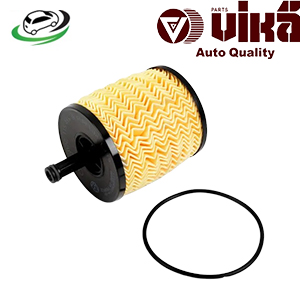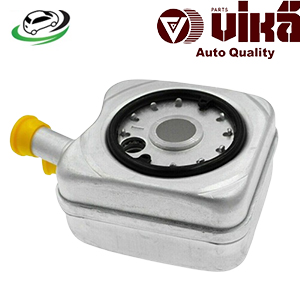-6%
Get AUDI A3 (8L1)/ A3 (8P1)/ A4 B5 (8D2)/ A6 C4 (4A2)/ A6 C5 (4B2)/ TT (8N3) / VW Bora (9M2)/ Bora I (1J2)/ Golf IV (1J1)/ Passat B6 (3C2) Engine Oil Cooler 078117021A
An engine oil cooler is a heat exchanger that cools the engine oil before it circulates back into the engine. It works by transferring heat from the engine oil to the surrounding air or coolant, ensuring that the oil does not become too hot during operation. This cooling process is critical because engine oil that is too hot can lose its lubricating properties, leading to increased friction, wear, and ultimately engine damage.
Engine oil coolers can be either air-cooled or liquid-cooled, depending on the design of the vehicle and the cooling system. In air-cooled systems, the cooler resembles a small radiator and relies on airflow to dissipate heat. In liquid-cooled systems, the engine oil passes through a heat exchanger connected to the engine’s coolant system.
2. Functions of an Engine Oil Cooler
The primary functions of an engine oil cooler include:
2.1. Cooling Engine Oil
The main function of the oil cooler is to lower the temperature of the engine oil. As the oil circulates through the engine, it absorbs heat generated by the engine components. The oil cooler helps dissipate this heat, ensuring that the oil remains at a safe operating temperature.
2.2. Maintaining Optimal Oil Viscosity
Engine oil has specific viscosity characteristics that allow it to flow and lubricate engine parts effectively. High temperatures can cause the oil to thin out, reducing its ability to lubricate and protect the engine. By maintaining a consistent oil temperature, the cooler helps ensure that the oil retains its proper viscosity, improving its lubricating properties.
2.3. Extending Engine Life
By preventing the oil from overheating, the oil cooler helps reduce wear and tear on engine components. This can significantly extend the life of the engine, as well as reduce the likelihood of costly repairs or failures.
2.4. Enhancing Performance
An engine operating with well-cooled oil can perform more efficiently. Proper lubrication helps reduce friction, allowing for smoother engine operation, improved fuel efficiency, and enhanced overall performance.
3. Benefits of an Engine Oil Cooler
Utilizing an engine oil cooler offers several benefits, including:
3.1. Improved Engine Efficiency
By keeping the engine oil at an optimal temperature, the oil cooler helps the engine operate more efficiently. This can lead to better fuel economy and reduced emissions, contributing to overall vehicle performance.
3.2. Enhanced Lubrication
With the oil cooler maintaining appropriate oil viscosity, the engine receives better lubrication. This reduces wear on moving parts, helping to maintain engine performance over time.
3.3. Reduced Risk of Engine Overheating
An effective oil cooler can prevent overheating by dissipating excess heat from the engine oil. This reduces the risk of engine damage and extends the life of various engine components.
3.4. Increased Oil Longevity
Keeping the engine oil cooler can help prolong its life, reducing the frequency of oil changes. This not only saves money on oil but also helps reduce waste and environmental impact.
3.5. Compatibility with High-Performance Applications
For high-performance engines or vehicles subjected to extreme conditions (such as towing, racing, or off-roading), an oil cooler is often necessary to maintain optimal oil temperatures. This ensures that the engine performs reliably under demanding circumstances.
4. Common Issues with Engine Oil Coolers
Despite their importance, engine oil coolers can encounter various issues, including:
4.1. Clogging
Over time, debris, sludge, and contaminants can accumulate within the oil cooler, restricting the flow of oil and reducing its cooling efficiency. Clogged coolers can lead to elevated oil temperatures, resulting in reduced lubrication and potential engine damage.
4.2. Leaking
Oil coolers can develop leaks due to corrosion, physical damage, or worn seals and gaskets. Leaks can result in oil loss and reduced lubrication, leading to engine overheating and potential failure.
4.3. Coolant Contamination
In liquid-cooled oil coolers, a failure can occur that allows coolant to mix with engine oil. This can lead to serious engine damage, as coolant does not provide proper lubrication and can cause internal corrosion.
4.4. Insufficient Cooling
If the oil cooler is not functioning effectively due to design issues, size constraints, or poor airflow, the engine oil may not be adequately cooled. This can lead to overheating and reduced engine performance.
5. Maintenance Tips for Engine Oil Coolers
Regular maintenance can help ensure that your engine oil cooler operates effectively and extends its lifespan. Here are some essential maintenance tips:
5.1. Regular Oil Changes
Changing the engine oil according to the manufacturer’s recommendations is vital for keeping the oil cooler clean and free from sludge and contaminants. Fresh oil will flow better and help prevent clogging in the cooler.
5.2. Inspect for Leaks
Regularly inspect the oil cooler, lines, and connections for any signs of oil or coolant leaks. If you notice any leaks, address them immediately to prevent further damage to the engine.
5.3. Check for Clogs
Monitor the performance of your engine oil cooler. If you notice higher oil temperatures or reduced lubrication efficiency, have the cooler checked for clogs or blockages.
5.4. Flush the Cooling System
If your vehicle has a liquid-cooled oil cooler, it’s important to flush the cooling system periodically to remove contaminants and prevent clogging. This helps maintain effective heat transfer and cooling.
5.5. Inspect and Clean Airflow Areas
For air-cooled oil coolers, ensure that the cooler fins are free from debris and dirt that could obstruct airflow. Regular cleaning will help maintain proper cooling performance.
5.6. Monitor Oil Temperature
Keep an eye on the oil temperature gauge. If you notice fluctuations or higher-than-normal readings, investigate the cause, as it may indicate a problem with the oil cooler or the lubrication system.
6. Conclusion
The engine oil cooler is a vital component of the vehicle’s cooling system, responsible for regulating the temperature of engine oil and ensuring optimal performance. By preventing overheating, maintaining proper oil viscosity, and enhancing lubrication, the oil cooler contributes significantly to engine efficiency, longevity, and reliability.
Understanding the functions, benefits, common issues, and maintenance tips associated with engine oil coolers is crucial for vehicle owners. Regular maintenance and prompt attention to any issues can help ensure that your engine operates smoothly and efficiently for years to come. By investing in the proper functioning of the oil cooler, you contribute to the overall health of the engine, maximizing performance and minimizing the risk of costly repairs.
Follow us on Facebook for more parts.




Reviews
Clear filtersThere are no reviews yet.